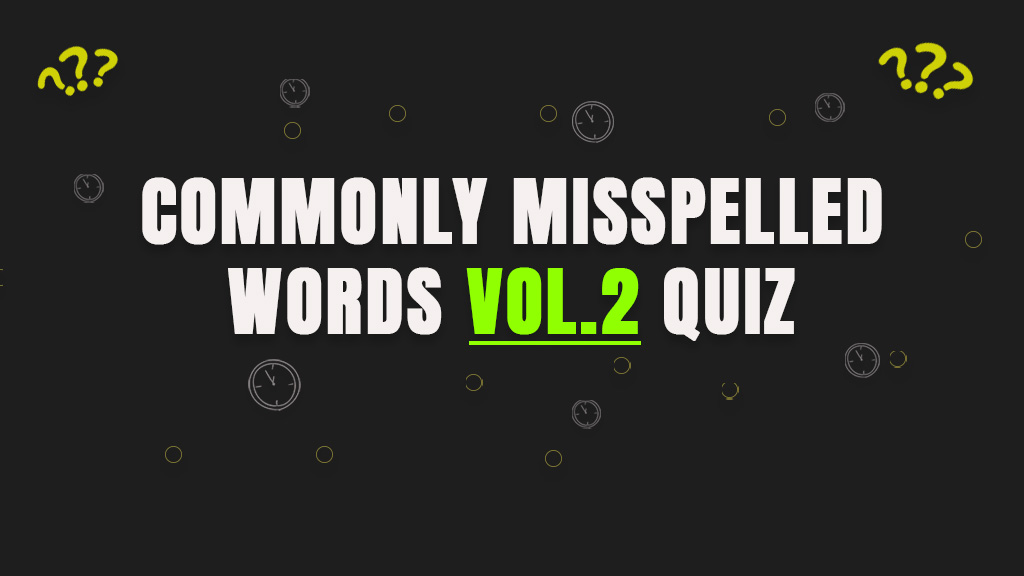❤️It's Trivia, but Sweeter❤️
Commonly Misspelled Words Vol.2 Quiz

Commonly misspelled words are a frequent source of confusion for many people, even those who are otherwise proficient in English. This challenge occurs for several reasons, including irregularities in English spelling rules, phonetic similarities, and differences in regional dialects. In this article, we’ll explore some commonly misspelled words and why they tend to trip people up. Understanding these patterns can help reduce spelling mistakes and improve overall writing accuracy.
One of the most frequent types of spelling errors occurs with words that have silent letters. For example, “receive” is often misspelled as “recieve” because of the way the word sounds when spoken aloud. The sequence “ei” and “ie” is notorious for being problematic. In the case of “receive,” the correct order is “ei,” which can be remembered by the rule “I before E except after C.” However, exceptions to this rule exist, so relying solely on it can be misleading.
The word “separate” is another commonly misspelled word. It’s frequently written as “seperated” or “seperrate.” Many people struggle with the placement of the vowels in the middle of the word. The correct spelling is “separate,” with an “a” in the middle. This mistake often arises because of the similarity to words like “separation,” which may lead to confusion in the correct vowel choice. A helpful tip to remember the spelling is to associate it with the word “par,” as it’s a consistent part of both “separate” and “par.”
“Definitely” is another word that people often misspell. It’s frequently written as “definately” or “definetely,” even though the correct spelling contains an “i” after the “n.” This is a perfect example of how the rules of phonetics don’t always match the spelling of words in English. The reason for this is rooted in the history of the English language, where words evolve over time, and their phonetic pronunciation doesn’t always match their written form.
Words with double consonants are also a major source of spelling mistakes. For example, “occurred” is often misspelled as “occured” or “ocurred.” The rule for doubling the consonant after a short vowel sound doesn’t always apply in an intuitive way. However, in the case of “occurred,” the correct spelling involves two “r”s to maintain the structure of the word. The double “r” helps to retain the soft vowel sound in the middle of the word. Many people make this mistake because they don’t recognize that doubling the consonant is necessary for maintaining the integrity of the original word.
The word “government” is often misspelled as “governement” or “govermant.” This error is likely due to the “e” after the “v” being overlooked. Additionally, some people might confuse the word with other similar words like “governance” or “governor,” which can lead to the incorrect spelling. The confusion arises because the ending “-ment” is a common suffix in English, but it’s important to remember that in the case of “government,” the “e” is not dropped.
“Embarrassed” is another word that tends to trip up many people, and is often misspelled as “embarassed” or “embarrased.” The reason for this is that English speakers may not always stress both “r” sounds when saying the word aloud. This can cause the double “r” to be lost in written form. The word “embarrassed” is derived from the Latin “embarrassare,” which means “to block” or “to hinder,” and its spelling with two “r”s reflects its historical roots. A simple trick to remember the correct spelling is to think of the word as “embarrass + ed,” which makes it clear that the word ends with two “s”s.
“Supersede” is frequently confused with “supercede,” though the correct spelling is “supersede.” This confusion arises due to the similarity in pronunciation, as the two words sound almost identical. The word “supersede” comes from Latin, where “super” means “above” and “sedere” means “to sit,” so it literally means “to sit above” or “to take the place of.” The correct spelling uses an “s” instead of a “c,” which can be challenging because of how the word is pronounced in casual speech.
“Privilege” is another word that people often misspell, with variations like “privelege” or “privllege.” The tricky part here is the “i” before the “l” and the “e” before the “g.” A helpful mnemonic device for remembering the correct spelling is “prIvilege” – emphasizing the “i” after the “r.” Additionally, some people misspell the word because of its similarity to other words like “public” or “private,” which don’t have the same pattern. Despite these challenges, “privilege” remains one of those words that must be memorized, as there are no simple phonetic rules to guide its spelling.
“Accommodate” is often misspelled as “accomodate” or “acommodate.” The double “c” and double “m” in the middle of the word cause confusion for many people. This word comes from the Latin “accommodare,” meaning “to make fit” or “to adjust.” The proper spelling requires two “c”s and two “m”s, which is sometimes overlooked because of how the word is pronounced. One way to remember the correct spelling is to think of the word as “accommodation” with a simplified ending.
Finally, the word “resistance” is commonly misspelled as “resistence” or “resistence.” The issue lies in the placement of the “i” and the “e.” As with many other words, English speakers tend to make spelling mistakes based on how words sound when spoken. The correct spelling has an “a” after the “s,” which is consistent with the Latin root of the word, “resistentia.”
Understanding why these words are commonly misspelled can help improve your spelling skills and reduce errors in your writing. By recognizing patterns in misspelled words and applying some simple memory techniques, you can avoid common pitfalls and write more accurately. Additionally, reading regularly and paying attention to how words are spelled in professional writing can help reinforce correct spelling in your own work.
The importance of spelling cannot be overstated, especially in a world where written communication is crucial in both professional and personal contexts. Misspelled words can undermine the clarity and professionalism of your writing, so taking the time to review and correct your spelling is essential. Regular practice and awareness of commonly misspelled words will lead to improvement and greater confidence in your writing. By focusing on the words that trip you up the most and using strategies to remember their correct spelling, you’ll become a more proficient and accurate writer over time.



